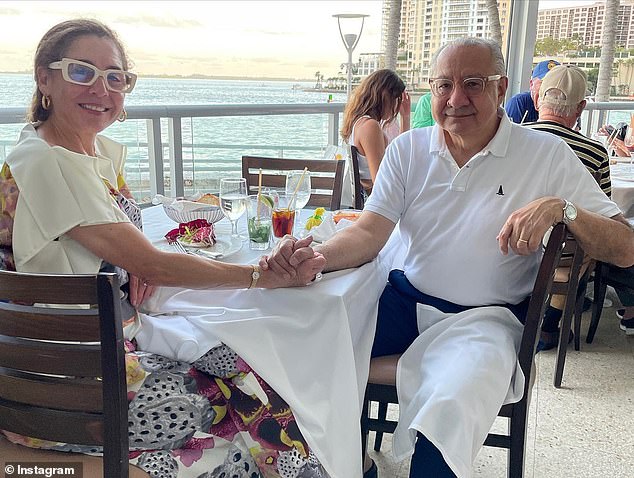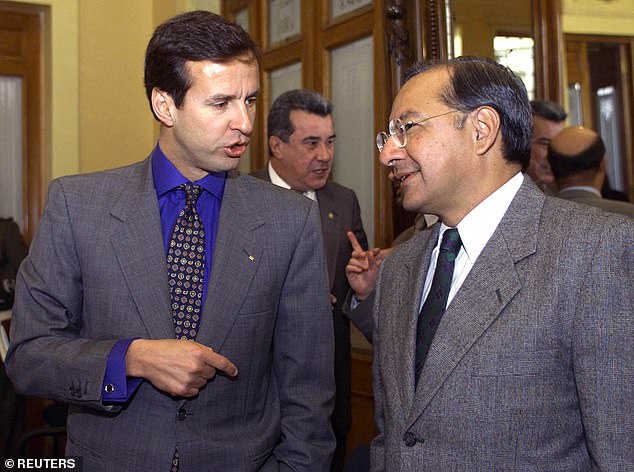Former US ambassador to Bolivia ADMITS being a Cuban spy for 40 years as he dramatically enters guilty plea – after he was caught branding America ‘the enemy’ in FBI sting
A former U.S. ambassador to Bolivia accused of spying for Cuba for four decades told a judge Thursday that he sensationally admitted to the charges and said he had been gathering information for the rogue state since 1981.
Victor Manuel Rocha, 73, was arrested in December for what U.S. officials called “one of the most far-reaching and longest infiltrations of the U.S. government by a foreign agent.”
Rocha pleaded not guilty two weeks ago to charges of conspiracy to act as an agent of a foreign government, but he told Judge Beth Bloom during a pre-trial conference Thursday that he wanted to change his plea.
The court set a date of April 12 for Rocha to formally change his plea to guilty and for sentencing.
Rocha was appointed to Bolivia in 2000 by then-President Bill Clinton.
Victor Manuel Rocha, 73, was arrested in December for what U.S. officials called “one of the most far-reaching and longest infiltrations of the U.S. government by a foreign agent.”

Rocha’s wife, Karla Wittkop Rocha (left), declined to comment when contacted by AP. “I don’t need to talk to you,” she said before hanging up
Rocha, a naturalized U.S. citizen originally from Colombia, is believed to have started helping Havana in 1981 as a secret agent for Cuba’s Directorate General of Intelligence (DGI), and according to U.S. authorities, his espionage activities continued until his arrest.
Rocha lived in the Miami area with his wife, graphic designer Karla Wittkop Rocha. The couple has two adult children together.
Attorney General Merrick Garland said in announcing Rocha’s arrest that he had “repeatedly referred to the United States as ‘the enemy’ and “repeatedly bragged about the significance of his efforts.”
Rocha joined the State Department in 1981 and rose through the ranks as a career diplomat, also holding posts in Havana, Buenos Aires, Mexico City, the Dominican Republic and Washington.
Rocha served on the National Security Council from 1994 to 1995 under President Bill Clinton’s administration and served as ambassador to Bolivia from 2000 to 2002 under Clinton and George W. Bush. He also served as an advisor to the US military command responsible for Cuba.
The indictment against Rocha details how, during multiple meetings with an undercover FBI agent beginning in November 2022, he “acted like a Cuban agent,” praising the late leader of the communist-ruled island Fidel Castro and using “the term ‘we’ used to describe themselves and Cuba.’
He admitted that he had traveled to Havana in 2016 or 2017 to meet his DGI handlers and asked the undercover agent to send “my warmest regards to the Direccion,” referring to the DGI.
Other Americans arrested for leaking secrets to Havana include Walter Kendall Myers and Gwendolyn Myers, who were indicted in 2009 on charges of nearly three decades of spying for Cuba.

As ambassador to Bolivia, Rocha (right) intervened directly in the 2002 presidential race
– ‘Murdered’ by Cuba –
Rocha also faces a lawsuit filed Thursday in Florida by the widow of Cuban dissident Oswaldo Paya.
She claims Rocha was responsible for the death of her late husband, the winner of the European Parliament’s 2002 Sakharov Prize for Human Rights, in a car crash in Cuba in 2012.
A court document alleges that “the Cuban terrorist dictatorship murdered Mr. Paya with impunity” as a direct result of Roche’s “actions as a covert agent for the Cuban terrorist dictatorship and its intelligence gathering mission against the United States.”
Another Cuban dissident, Harold Cepero, also died in the same car accident, while two others in the vehicle survived: Spanish politician Angel Carromero and Swedish conservative politician Jens Aron Modig.
Cuban authorities blamed Carromero, who was driving, but he claims the car was hit by a Cuban secret service vehicle.
In a report published last June, the Inter-American Commission on Human Rights (IACHR) concluded that Cuban state agents were involved in the dissidents’ deaths.
“I am seeking what I have always sought: for the truth, for justice and for the regime and its accomplices” to “stop acting with impunity,” Paya’s widow Ofelia Acevedo said in a statement.
